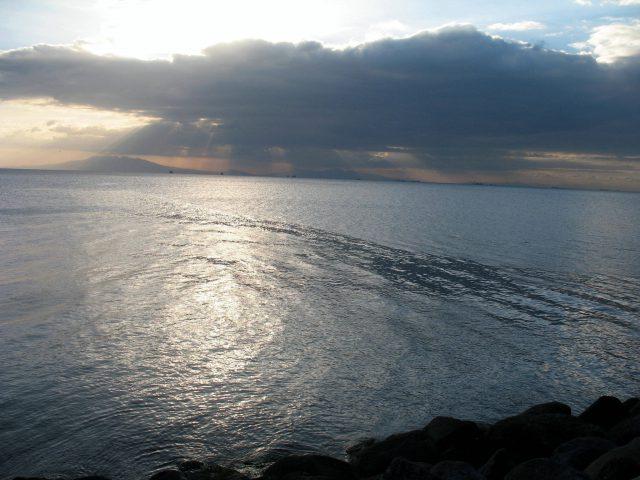Duterte’s push for joint exploration in the South China Sea
Posted By Aaron Jed Rabena on January 31, 2018 @ 12:47

From being a frontrunner in pressing China on the South China Sea disputes, the Philippines under President Rodrigo Duterte is seeking closer relations with China. In his state of the nation address in July last year, Duterte announced [1] that he wants to begin a joint exploration venture with China in the South China Sea, in the area that Philippine government agencies refer to as the ‘West Philippine Sea’. The Chinese hailed [2] the initiative as ‘full of political wisdom’.
A joint development project seems to serve both sides. Duterte may be engaging in conflict management and preventive diplomacy to ease regional geopolitical tensions and avoid confrontation with China. And he may be pursuing economic diplomacy to address the Philippines’ growing demand for energy security. The Malampaya gas field, for example, which supplies one-third of Luzon’s energy demand, will be depleted [3] within a decade.
For China, a joint project would conform to its use of ‘neighborhood diplomacy’ (周边外交) to maintain a stable periphery. After all, Beijing’s professed stance on the South China Sea has always been about ‘shelving differences and seeking joint development’ (搁置争议, 共同开发). Working with the Philippines would also allow China to demonstrate the efficacy of bilateral arrangements while giving it access to new sources of energy.
But the situation is more complicated than it first appears. The joint exploration project involves both ‘disputed’ waters—waters within the Philippines’ exclusive economic zone but claimed by China based on its nine-dash line—and ‘undisputed’ waters that fall entirely within the Philippines’ territory or jurisdiction.
Take the disputed waters first. The Philippines has tried cooperation with China in disputed areas before. Former president Gloria Arroyo signed a joint marine seismic undertaking with China and Vietnam for the period 2005–2008 covering waters claimed by all three countries, although the project didn’t proceed to the extraction phase due to legal and political constraints. And in a unilateral [4]exploration attempt, Manila issued a concession for Reed Bank, located west-northwest of Palawan Island, but it met strong diplomatic and physical resistance from China. No work was completed and Reed Bank remains unexploited.
Technically, the Philippines could develop the West Philippine Sea on its own. In 2016, the Permanent Court of Arbitration (PCA) at The Hague ruled [5] that China’s nine-dash line and associated claims of historic rights run counter to the UN Convention on the Law of the Sea. It also ruled that none of the geological features (let alone artificial islands) in the South China Sea count as islands, which means they can’t be used to determine maritime economic zones. However, China doesn’t recognise the PCA’s ruling and has the hard power to enforce its claims. If the Philippines were to unilaterally recommence exploration of the disputed waters, it would certainly encounter stern opposition from China once again.
Joint exploration in undisputed waters could be more straightforward. In 2006, for instance, the Chinese national offshore oil company signed a commercial agreement with the Philippine national oil company’s exploration arm to explore the Calamian area, which lies north-northwest of Palawan Island. However, that project was put on hold in 2008. Duterte could revive it as one of the first joint venture projects with China.
It seems unlikely, though, that Beijing would accept using a joint venture model in the disputed waters because that could be tantamount to accepting the PCA ruling. Moreover, the Philippine constitution, through a presidential decree [6], stipulates that Filipinos should benefit more than foreign partners and that the government should receive 60% of net profits in joint venture projects involving Philippine petroleum resources. China would probably baulk at such an inequitable distribution.
There are also fears in the Philippines that if Manila proceeds with the joint project in disputed waters, that may be construed as implicitly validating China’s claims in the area and abandoning the PCA’s judgement. But if the Philippines doesn’t proceed, the hydrocarbon deposits will remain untapped. Manila doesn’t have enough technological capability to develop deep-sea energy resources on its own.
Pushing through with the joint development in disputed waters also entails political risks for Duterte. The Philippines’ credibility with its international allies and partners may diminish if it seems to undercut the PCA ruling. Nationalist groups will perceive any compromise that circumvents the ruling or the constitution as cowardice or treason. When Arroyo signed the joint exploration deal with China and Vietnam, she was accused [7] of selling out the country, trading Philippine territory and sovereignty for Chinese investment.
Despite these difficulties, Duterte’s quest for cooperative relations with China in the South China Sea isn’t at a dead-end. There’s talk in the Philippines of revising the constitution to amend the provisions that limit foreign investment and ownership. If that happens, there could be greater legal flexibility in offering a 50–50 sharing of profits. And a joint venture in undisputed waters could be a confidence-builder that leads to better management of other aspects of maritime security in the disputed waters.
This post was adapted from the author’s presentation at the 4th ASEAN–EU High-Level Dialogue on Maritime Security Cooperation held in Manila last year.
Article printed from The Strategist: https://aspistrategist.ru
URL to article: /dutertes-push-joint-exploration-south-china-sea/
URLs in this post:
[1] announced: https://www.rappler.com/nation/176605-duterte-philippines-china-joint-exploration-west-philippine-sea
[2] hailed: https://www.rappler.com/nation/176675-china-foreign-minister-wang-yi-philippines-joint-development
[3] depleted: http://www.gmanetwork.com/news/money/economy/627515/doe-cites-need-to-expand-lng-facilities/story/
[4] unilateral : http://www.interaksyon.com/oil-drilling-in-west-ph-seas-reed-bank-may-resume-before-year-ends-says-doe-exec/
[5] ruled: https://www.rappler.com/nation/137202-philippines-china-ruling-case-west-philippine-sea
[6] presidential decree: https://www.doe.gov.ph/presidential-decree-no-87
[7] accused: http://news.abs-cbn.com/blogs/opinions/07/28/17/opinion-multi-billion-peso-projects-in-exchange-for-chinese-exploration-in-ph-eez
Click here to print.